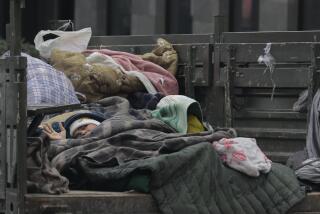Regional Officials Study Options for Disputed Enclave
- Share via
MOSCOW — Leaders of the disputed region of Nagorno-Karabakh in the mountainous southern Soviet Republic of Azerbaijan are discussing proposals for a temporary compromise to the prolonged dispute over its future, senior Communist Party officials said Thursday.
One proposal would put the region, a predominantly Armenian enclave, under the Supreme Soviet, the national legislature, until a decision is reached on whether to transfer it to neighboring Armenia, as local leaders have demanded, or to leave it as part of Azerbaijan.
Another compromise, also intended to buy time to work out a permanent settlement, would transfer the region temporarily to the Russian Federation, one of the country’s constituent republics, which is headquartered in Moscow.
A third proposal would place it, again temporarily, under the administration of Soviet leader Mikhail S. Gorbachev’s home region of Stavropol.
Compromise Rejected
“These proposals are being discussed in Armenia and, more important, in Nagorno-Karabakh,” Eduard Dzhrbashyan, of the Armenian Academy of Sciences, told a news conference here. “They are really the views of Nagorno-Karabakh itself.”
But leaders of the Azerbaijan Communist Party rejected any possible compromise that would remove the area from their control, even temporarily.
“We have decided that it is impossible to agree to those proposals,” said Suleiman B. Tatliev, chairman of the presidium of the Azerbaijan Supreme Soviet, the republic’s legislature.
Instead, the solution should come through closer cooperation with the Armenian authorities to defuse ethnic tensions, Tatliev insisted, speaking at a later news conference.
“We must conduct work to calm the situation,” he said. “We know there is tension in Armenia, but we will talk with them and the leadership of Nagorno-Karabakh and hope in the near future everything will be returning to normal.”
The dispute is the most explosive of a dozen serious ethnic problems now confronting the Soviet leadership. According to official figures, 35 people have died in rioting over the issue, most of them Armenians killed in what the government describes as a “pogrom” against them in the Azerbaijani city of Sumgait.
Right to Self-Determination
Nagorno-Karabakh’s Armenian residents paralyzed the region with a monthlong general strike, which is only now ending, and troops were dispatched there and to other areas of Azerbaijan and Armenia earlier this month to maintain order as unrest grew.
Armenia’s legislature has endorsed the Nagorno-Karabakh request, arguing that the region, three-quarters of whose 184,000 people are Armenians, has a right to self-determination under the Soviet constitution.
But Azerbaijan, which has administered the area since 1923 and considers it an integral part of the Azerbaijani homeland, has rejected the transfer, contending that any change of internal boundaries will require its agreement.
“The question is extremely complicated because the two republics have taken practically opposite decisions,” Grant M. Voskanyan, Armenia’s president, told journalists covering the special Communist Party conference here.
“In such a situation, governmental wisdom to resolve the issue . . . in the interests of all the people is demanded of our republic and of all of us.”
A senior Azerbaijani party official, Afrand Dashdamirov, noting that Armenians constitute only 8% of the republic’s 7 million people, argued that it is impossible to allow each minority to decide whether it wants to secede.
“If you followed that logic, it would bring the disintegration of Azerbaijan,” he said.
Dashdamirov, who serves as the head of propaganda of the Azerbaijan Communist Party’s Central Committee, twice described ethnic conflict as normal in any area of many nationalities.
Despite their apparent unwillingness to compromise, senior party officials from Azerbaijan admitted that conditions in Nagorno-Karabakh remain unsettled.
Situation Tense
“At present, the situation in general in the region and in its capital, Stepanakert, is tense,” Tatliev said. “The industrial enterprises do not work--they stand idle.”
He said that members of the Azerbaijan Supreme Soviet were in the city Thursday, talking with workers in an attempt to normalize conditions.
Gorbachev had attempted to solve the problem with an impassioned appeal for peace after mass demonstrations, first in Nagorno-Karabakh, later in Armenia and finally in the major Azerbaijani cities. The region would remain part of Azerbaijan, party officials said, but would be allowed closer ties with Armenia.
This compromise was unacceptable to Armenians--those outside Nagorno-Karabakh as well as inside--who have insisted that they will not accept any form of continued rule by the Azerbaijanis, a Muslim Turkic people. The Armenians, who are Christians, contend that insufficient funds have been devoted to economic development there and that they are discriminated against on religious grounds.
More to Read
Sign up for Essential California
The most important California stories and recommendations in your inbox every morning.
You may occasionally receive promotional content from the Los Angeles Times.













